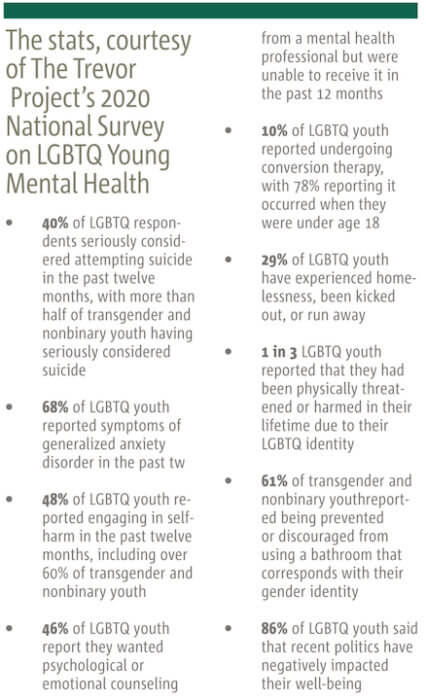Risk factors
The stigma against mental illness has improved somewhat over the last decade. And one of the most important things that someone with a serious mental illness requires is a support network.
When it comes to LGBTQ youth, who are statistically at a heightened risk of struggling with depression, anxiety, bipolar disorder, substance abuse or suicidality, there is a higher chance that their support system will be limited, as they are more likely to live in an unaccepting home environment.
Research published by The Trevor Project found that one-third of LGBTQ individuals experienced parental acceptance, one-third experienced parental rejection, and one-third did not disclose their sexual orientation or gender identity until adulthood.
Violence and victimization are a constant threat to LGBTQ youth, as statistics show. But this victimization is not always expressed in acts of physical violence. In the case of pronoun use, “sticks and stones may break my bones, but names will OFTEN hurt me.” As The Trevor Project highlights, LGBTQ persons who had their pronouns used all or most of the time were half as likely to attempt suicide that those whose self-affirmations were disregarded.

The impact of COVID-19
The Trevor project highlighted the following issues that may put LGBTQ youth at a higher risk of suicide during lockdown conditions that their cisgender peers.
For many, teachers, social workers, friends and allies provide a support system that may be lacking at home. Supportive peers have been proven to reduce the likelihood of depression, and LGBTQ groups offer safe spaces and a sense of community and belonging.
Crucially, under lockdown conditions, LGBTQ youth may be confined to unaccepting environments for extended and indefinite periods of time. Studies show that parental rejection increases the likelihood of suicide eight-fold, and depression rates rise six-fold. Furthermore, amongst the one-third who conceal their gender identity until they are free of at-home parental constrictions—transgender or non-binary persons—the likelihood of dysphoria is also heightened.
Furthermore, unaccepting home environments have been proven to exacerbate physical, emotional and sexual abuse from family members and others for LGBTQ youth, compared to their straight or cisgender peers. Isolation is therefore a deeply important concern for the wellbeing for LBGTQ persons, particularly during lockdown conditions.
Insufficient national data collection
Alarming CDC Youth Risk Behavior Survey data released on August 20 found that over a quarter of youths ages 18-24 seriously considered suicide in the month of June, highlighting the mental health crisis that is accompanying the pandemic, for all young people, regardless of gender identity.
The problem with CDC data is that it does not segment by gender identities such as non-binary, transgender or gender fluid persons—an issue that many LGBTQ advocates are lobbying for. As such, the YRBS standard questionnaire and dataset only accounts for lesbian, gay and bisexual youth
Analyzing data on LGBTQ mental wellbeing and suicide, The Trevor Project published a peer-reviewed document that showed that transgender and non-binary or gender fluid are at an even higher rate of depression and were 2 to 2.5 times as likely to experience depressive symptoms, seriously consider suicide, and attempt suicide compared to their cisgender lesbian, gay, bisexual, queer, and questioning peers.
It is critical that our national data collection agencies become more inclusive and increasingly stratified in order to account for suicide rates amongst non-binary, gender fluid individuals and all of the nuanced gender identifications that young people live with as their authentic selves. If we do not have this data on a national level, we do not know with exactitude how bad the situation is for LGBTQ youth, or how to strategize to prevent suicide and self-harm in these communities
Anyone who suspects instances of child abuse and/or neglect are urged to contact State Child Abuse and Neglect Hotline Numbers or the National Domestic Violence Hotline at (1-800-799-7233)
The Trevor Project offers a range of resources for LGBTQ youth including a 24/7 crisis intervention line at 1-866-488-7386, an online chat resource at www.TheTrevorProject.org/Help, or by texting START to 678-678.





























